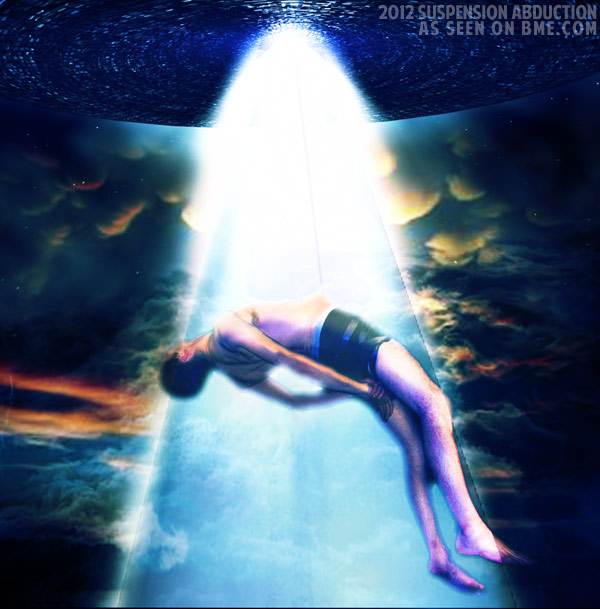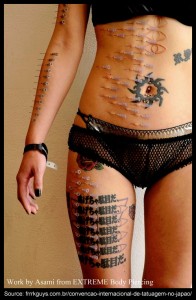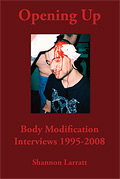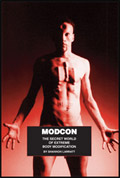I can barely do anything today because yesterday I spent maybe half an hour making myself an inverted screen stand. Because it’s extremely painful for me to hold my head up for more than an hour or two, plus because I can’t hold a book (or more usually, ebook) up to read it for long, I wanted to make myself a device that would let me levitate a screen over my face while I’m lying down. I’ve been able to type blind since I was a child, so it’s no problem to rest a keyboard at my waist and type (or flip through pages). I hope it will help me to put in more hours on writing, because I’m not making close to the amount of progress I need to make to get the books finished in time. I’m so wrecked right now I can barely think straight, and I expect it will be a bit worse tomorrow… As near as I can figure, because the genetic code for building new muscle (and perhaps nerve) is totally fucked up and instead of building healthy muscle builds weird looking grids of calcium garbage instead, when I heal, the injured tissue turns into injured tissue that’s all knitted together with shards of tubular calcium, and then movement rips me apart on the inside for the next few days as I learn to cope with the damage. This is also why some of the solutions that might help in conditions with similar symptoms — HGH or steroids for example — have the potential to accelerate my problems, leaving me in a very precarious position where every treatment or therapy comes with serious risk and my best bet seems to be to just make as few waves as possible…

I’ve mentioned occasional short updates on Facebook, but for those that avoid that ignoble network, I’ll try and collect the misery here. Over the summer I thought that some doors had opened when I got an appointment with a doctor that’s supposed to be an expert on the central apnea issue, which is not only dangerous of its own accord, but is tying my doctors hands on treating the pain because of fears that I’ll die in my sleep — they already have that fear. Anyway, I had a sleep study done last summer, but because they only monitored O2 saturation (which dropped to 72% during the night if memory serves, hovering around 80% most of the night, with an apnea even every minute or two all night long) but they didn’t monitor CO2 levels so the doctor ordered a new one, which was done at the end of July. I was told I’d have the results in a week or two, and then they’d fast-line me into another appointment. I felt like I was being taken seriously by the experts.
From the results of the first study, I wasn’t really sure what to expect from the new sleep study. I have these so-called apnea events while I’m awake as well, and part of me thinks they’re caused by my interest in breath-holding and freediving when I was younger. On the long bus rides home, especially alone when I took the late bus, I repeatedly held my breath to pass the time. I can’t do it any more, but I was regularly holding my breath for over five minutes at a time. I still breath slowly, often only four or five times a minute (about a third “normal”), and I have to wonder if either I’ve borked my breathing-rate-wetware somehow, or if this is just “normal for me”. I don’t know if there’s even any way to know.
So anyway, I did the new sleep test. Time passed. A month later I had an appointment with my regular doctors, who I’d been told would be receiving the results as well as the specialist. He had gotten nothing, and promised me that he’d track them down, as well as getting the other expert (the neuromuscular one) going, and we made a follow-up for two weeks later. During that time, I got a letter from the specialist — my “expedited” follow-up appointment to discuss my problems was set for late February 2013. This made me think that perhaps the results were in and nothing to worry about, but I’m sure you won’t be surprised to hear that when I got to my doctor, nothing had arrived. He told me that he’d been calling and emailing both doctors every couple of days without any response at all and was at a loss to explain the lack of contact and felt very frustrated. Sometimes I feel good about everything, and at other times I feel like he’s the only doctor that cares if I live or die… I suspect part of that is the rarity of my condition coupled with the fact that since it almost certainly can’t be treated let alone cured, on a emotionless objective level, their efforts are wasted on me.
Since hospitals here are required to give patients copies of their records if they ask, we figured the best course of action would be to take matters into my own hands and go to the hospital in person. I went to the records office in the basement, and while they could find my initial appointment with the doctor, they couldn’t find anything else. There was no record at all of me having had a sleep study done. The records people were actually surprised to even find out that there was even a sleep lab in the hospital and thought maybe I was getting hospitals mixed up. In the end they tracked down the sleep clinic and send me up to the top of the elevator to see if maybe my results were just sitting on a desk unfiled. When I got to where they sent me, there was no sleep lab — just the cardiac nurse’s station. They went through their directory though and found the floor for the sleep lab, so eventually I got there and found it closed. No one in the other departments on the floor knew anything useful, because the sleep lab people are only there at night. So I went back down to the basement. On the way there, I realized that I was carrying my tablet, which I’d brought with me when I had my study done. A lot of the time I put paperwork in the tablet case, which has a handy pocket for such things. When I checked there was the appointment details brochure they’d given me for the sleep test two months earlier. I kicked myself mentally for not having bothered to check, and when I got back to the records department I handed it to them and asked if it would help. They did what I should have done — called the number on it — and got an answer. All I had to do was head up to the right floor along with $5 and they could give me a copy. For some strange reason, the sleep clinic runs separate from the rest of the hospital, and they control their own records. I have no idea why they would do that, but half an hour later I had a copy of my study. It really underscored the need for patients to take active responsibility in making sure their care stays on track. Obviously this can be hard when you’ve got a debilitating condition that involves chronic pain, but it makes all the difference. If I’d done that, I would have saved myself a lot of stress and really would have had the results in a week or two. Not that I’m giving the system a pass, but I could have kept this from happening. I can not emphasize enough how important it is for patients to advocate for themselves.
Anyway, the results of the sleep study… The study was about six hours of sleep and although I had 116 arousal (as in waking up, not as in erections), I got lots of sleep — I am woken up by apnea events and pain, but get back to sleep almost instantly thankfully. However, there’s less deep sleep and REM than there should be. What’s more troubling of course is the fact that there’s on average one central apnea event per minute. That’s definitely more than a year ago, although last time they did the study there were longer periods of apnea, but this year I rarely stopped breathing for more than a minute, and periods of shallow breathing (hypopnea) were shorter as well. The testing showed apnea events while I was awake as well, including my oxygen levels dropping significantly, while awake, which was “nice” to see because it validated to me that I wasn’t imagining it. When you’re sick, and a lot of your issues don’t have obvious visual proof, you go through a lot of self-doubt, wondering if you’re lying to yourself. Of course I’d rather be lying to myself than actually being sick, but it’s reassuring to find out that your self-assessment is on the mark. Oh as a point of trivia, my oxygen saturation levels are by far the best while I’m in REM sleep — significantly better than when I’m awake even… I thought that was neat. As to how much better or worse or the same the central apnea is in comparison to a year before, or how bad it even is, I don’t know. Seeing as last time I was dropping into the low 70s of O2 saturation, and this time I rarely dropped below the mid 80s, that seems good. That said, the absolute highest I was able to get my O2 levels was 96%. So I don’t know if that’s bad, or if my body is simply adjusted to low O2 levels. My theory is that I’m a wereyak or something. Or maybe a reincarnated Tibetan Buddha that’s used to living high in the mountains in some previous life.
The thing that worried me though is that not only is my breathing stopping constantly, but my heart is stopping on a regular basis. First I’ll mention another REM trivia — during REM sleep, I have the lowest heartrates, with it spending about half the time under 50bpm. I had expected that my heart rate would have been faster when dreaming rather than slower. I guess I have relaxing dreams. The other interesting thing is that when I’m dreaming is the only time that my heart doesn’t “stop” — yes, it slows to under 40BPM, but at all other times (even awake), my heart rate slows to 12 – 15bpm. For context, that means that my heart is only beating once every four or five seconds. I can’t quite tell from the charts though whether this is a slow heartrate that briefly continues, or if it’s a temporary stoppage that’s measuring that way. But again, you’ll note that the one time that my heart seems to behave is during REM. At the same time, my heart is freaking-the-fuck-out from time to time, beating at up to 64 beats per second according to the monitor (high enough that it can’t be rendered on their chart it seems). Now, on one hand the text shows a 0.0% rate of artifacts and bad data, but the two high-rate numbers 3840bpm and 568.9 are repeated, which makes me think that it’s not as literal a number as it purports to do. 3840 per minute, or 64 per second, I’m guessing is the maximum the meter reads. The other number I don’t have a good explanation for, but assuming it’s not a glitch, I can only assume that these represent some sort of rapid temporary fibrillation. Perhaps someone with hands-on knowledge beyond reading this can help explain it to me. I mean, I’m assuming tests like heart rate are mature enough and simple enough not to have significant errors. For all I know this stuff is inside the realm of normal. I get the impression that no one ever really believed that I could stop my heart for short periods consciously. I hope at least this helps to back up my statements about that…

Anyway, in a few days I should have the covers book (as should the people who ordered it sight unseen), which I’m quite excited about. Not much else to say right now, I really just wanted to update about this health stuff and it took way longer to type than expected. I think of things I want to post here all the time, but unfortunately my brain is more active than my body and by the time I finish my must-do tasks, I don’t usually have the strength left to post here… Perhaps that will change with my new bed-desk creation. I hope so. I was also going to try some speech recognition. I don’t think it will prove useful for normal writing, but it might work nicely for replying to emails and for casual blogging.
Apologies for the many typos and errors that surely riddle this entry.







